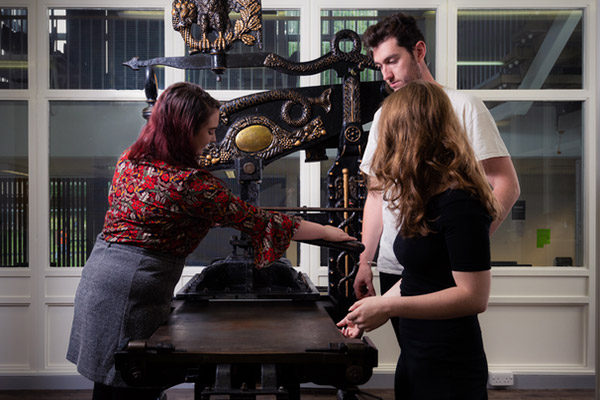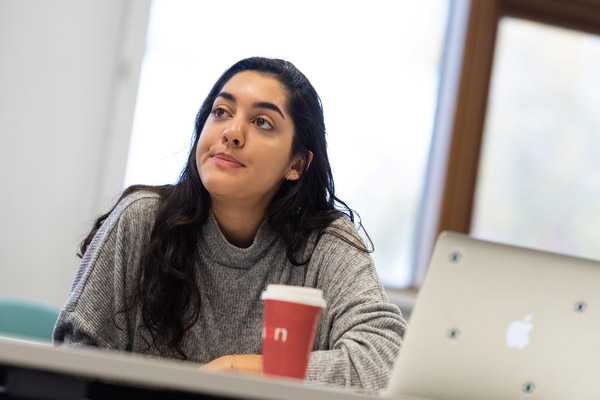View semester dates

BA (Hons) English/Politics
Discover how literature and politics shape the world.
Year of entry: 2026/27
View semester dates
6th in the UK for English
11th in the UK for politics
Why study English and politics at York?
Explore an extensive range of modules across two departments. In English, you’ll choose options covering all periods of literature from ancient classics to the present day, and explore literature from around the globe. You can also choose from options in film and creative writing. In politics, you’ll explore the principles of power, and learn to think politically about some of today's most pressing issues, such as poverty, debt, conflict and environmental change. Across the two subjects, you’ll be able to tailor your degree to your own interests.
Take an interdisciplinary view. You’ll bring your two subjects into dialogue with one another on Politics and the Novel, our bridge module designed for students on the English/Politics degree. This module acts as a springboard to the English/Politics Bridge Dissertation, allowing you to develop a topic that draws on the research and analysis skills developed on both sides of your degree.
Flexibility to add a Placement Year or Study Abroad. You’d then graduate with a BA in English and Politics (with Placement Year) or BA in English and Politics (with Study Abroad). Whether you’re interested in gaining experience in a particular industry or looking to expand your horizons by studying in another country, we’ll support you in exploring the options available to you.
Gain valuable skills that will set you up for a range of careers. You’ll develop your own research projects that address different briefs, learning to think critically, analyse texts, and develop persuasive arguments. Our Careers and Employability Coordinator will help you to think about these skills in relation to employability and to navigate the resources and opportunities available, including internships, a placement year, and more. We regularly advertise careers events by industry experts.

English and Politics at the University of York are fascinating and exciting subjects, with non-stop events and socials happening all year round. I’ve really enjoyed my time here studying, and feel I will leave wider knowledge, experiences and friendships.
Course content
You’ll cover an extraordinary range of literature and politics in this degree, from the classical era to the 21st century and from around the world. The degree is distinguished by opportunities to bring the two subjects into dialogue on our dedicated Politics and the Novel module, and through the bridge dissertation.
Year 1
In the first year of your degree, we’ll introduce you to the undergraduate study of English and Politics. Our modules will give you the skills you need to start undertaking literary and political research, and advice on how to combine the two disciplines.
English
Core modules
We’ll introduce you to an exciting range of texts and critical approaches in your first year to lay the foundation for your degree.
Politics
Core module
Option modules
You will study two option modules. Examples can be found below.
Some option module combinations may not be possible. The options available to you will be confirmed after you begin your course.
Academic integrity module
In addition to the above you will also need to complete our online Academic Integrity module.
Year 2
In the second year of your degree, you’ll take our exciting bridge module, Politics and the Novel, designed specifically for English/Politics students. You will also choose five from a wide range of option modules in the English and Politics departments.
Core modules
English
Intermediate Option Modules
Our Intermediate Option Modules allow you to deepen your understanding of the relationship between literary works and the cultural, historical, and political contexts in which they were produced.
- The Shock of the New: Medieval Literature
- The Renaissance
- Inventing Britain, 1700-1830
- Making the Modern: Global Literature in the Victorian Age
- Age of Extremes: Twentieth-Century British and Irish Literature
- American Literature: From the First World War to the End of Empire
- Creative Writing: Contemporary Practice
World Literature Modules
Our World Literature Modules invite you to engage with questions of language, translation, and cultural difference in ways that equip you with important skills in linguistic analysis and description. Some examples include:
- African Imaginations and Afrophone Literatures
- Against the Grain: European New Cinema
- Eros: The Literature and Philosophy of Love
- Introduction to Greek and Roman Literature
- Modern French and Francophone Literature
- Modern Latin American Literature
- Medieval Arabic and Persian Global Literature
- Old Norse Literature
- The World of Beowulf
Politics
Examples may include:
Semester One
- Things Fall Apart
- Politics of Development
- European Union Politics
- War and Peace
- IR Theory and Planet Politics
- Theories of the State
Semester Two
- The Politics of Gender
- Politics in the United Kingdom
- The Rising Powers
- Human Rights and Wrongs
- Research Design
Some option module combinations may not be possible. The options available to you will be confirmed after you begin your course.
Elective modules
You may be able to replace one option module with an elective module, studying a complementary subject, a language or an interdisciplinary topic.
Year 3
In the final year of your degree, you'll undertake a bridge dissertation, a year-long research project that brings your two subjects into dialogue with one another. The bridge dissertation is one of the distinctive features of the English/Politics degree at York, and offers you the chance to showcase the research and writing skills you have developed during your degree. Alongside the bridge dissertation, you'll also choose four options modules in the English and Politics departments.
Core module
You'll undertake a bridge dissertation module, choosing which department you'd like to supervise you.
English
In English, you will choose from the department’s Advanced Option Modules. These reflect the wide-ranging and cutting-edge research expertise of the Department, and our options cover literature from the classical period to the twenty-first century, as well as film and creative writing. Students can typically choose from over 30 options. Recent offerings have included:
- 21st Century American Fiction
- Black Writers of the Global Nineteenth Century
- Borders Bodies Bridges: Migration and Racialisation in Modern Literature and Culture
- Crafting the Past: Reimagining the Eighteenth Century
- Elemental: Contemporary Indigenous Literatures in English
- From Tennyson to Tolkien: The Middle Ages and Modern Literature, 1840-1940
- Green Romanticism: Nature, Ecology, Calamity
- Modernism's Queer Spaces
- Pulp Fictions of Medieval England: Romance and Popular Literature
- Spices and Spies: Renaissance Global Travel
- The Stuff of Poetry
- The Villains of Romantic Gothic
- The Writer's Notebook: A Prose Fiction Workshop
Politics
- Knowledge and Democracy
- Governing the Global Economy
- Green Politics
- ‘We the people’: Ideas of Democratic Representation from Rousseau to Occupy
Some option module combinations may not be possible. The options available to you will be confirmed after you begin your course.
Elective modules
You may be able to replace one option module with an elective module, studying a complementary subject, a language or an interdisciplinary topic.
Our modules may change to reflect the latest academic thinking and expertise of our staff, and in line with Department/School academic planning.
Learning outcomes
Every course at York has been designed to provide clear and ambitious learning outcomes. These learning outcomes give you an understanding of what you will be able to do at the end of the course. We develop each course by designing modules that grow your abilities towards the learning outcomes and help you to explain what you can offer to employers. Find out more about our approach to teaching and learning.
Learning outcomes for this course
- Engage, understand and identify the origins, evolution and contemporary dynamics of politics, including being able to apply this knowledge to addressing real world problems in areas like democracy, government, immigration, elections, human rights and the environment.
- Read diverse texts, especially literary texts, closely and critically, interpreting them with reference to the period, place, language and tradition in which they were produced and where they have cultural and political impact.
- Apply different theoretical perspectives, methods and concepts to aspects of politics and literary studies, as well as the intersection of the two disciplines. This will enable intellectual reasoning and systematic empirical testing to evaluate their strengths and weaknesses in politics, and the use of intellectual interpretive methods and critical argumentation skills in literary studies.
- Conduct independent interdisciplinary research by: conceiving and operationalising research questions; selecting and justifying the use of appropriate theories and concepts; establishing a suitable corpus of primary texts; gathering and interpreting data; synthesizing second sources; and, arriving at appropriate and justified conclusions.
- Lead groups and collaborate with others to achieve collective goals, including via group work and projects, problem-based exercises and presentations.
- Write clearly, accurately, and persuasively to a deadline, conveying complex ideas and representing detailed and relevant research.
- Explain and demonstrate to academic and other audiences the application of political and literary theory to important international, regional, national and local problems and issues. This will include an ability to communicate the benefits of combining politics and the study of literature via advanced oral communication skills.
- Act and communicate as a global citizen by exploring complex political and multicultural contexts. This will include an ability to foster and examine global ethics and cross-cultural dialogue, as well as promote equality, sustainability, cultural sensitivity, inclusivity and ethnic and linguistic diversity.
Fees and funding
The fees and funding information here is for students starting in the 2026/27 academic year.
If you take a year abroad or year in industry you'll pay a reduced rate of fees for that year.
Annual tuition fees
| UK (home) | International and EU |
|---|---|
| £9,535 (TBC) | £26,900 |
The UK government has announced its intention to increase tuition fees from £9,535 to £9,790 for the 2026/27 academic year. We expect this to apply to new UK (home) undergraduate students starting their studies in September 2026.
UK (home) or international fees?
The level of fee that you will be asked to pay depends on whether you're classed as a UK (home) or international student. Check your fee status.
Fees for subsequent years
- UK (home) fees may increase within the government fee cap in subsequent academic years. We will notify you of any increase as soon as we can.
- International fees are subject to increase in subsequent years in line with the prevailing Consumer Price Index (CPI) inflation rate (up to a maximum of 10%).
More information
For more information about tuition fees, any reduced fees for study abroad and work placement years, scholarships, tuition fee loans, maintenance loans and living costs see undergraduate fees and funding.
Additional costs
You'll need copies of the texts set for each module. Where possible, the Department works to arrange digital copies via the University Library. Where this is not practical, you'll be instructed in advance of the start of each term about the texts and editions you'll need to purchase (whether new or second-hand).
Funding
We'll confirm more funding opportunities for students joining us in 2026/27 throughout the year.
York, Oxford, Cambridge, Imperial
Just four UK universities are rated Gold for teaching and top ten for research* in the latest national assessment exercises.
* Awarded joint 10th in the Times Higher Education ranking of the Research Excellence Framework 2021.
Teaching and assessment
You’ll study and learn with academics who are active researchers, experts in their field and have a passion for their subjects. Our approach to teaching will provide you with the knowledge, opportunities, and support you need to grow and succeed in a global workplace. Find out more about our approach to teaching and learning.
Teaching format
In English, you’ll learn through a programme of seminars, lectures, workshops, and one-to-one consultations.
In Politics, you’ll also learn through a combination of seminars, lectures, workshops, and one-to-ones. Our staff are very approachable and our doors are always open.
- You can typically expect eight contact hours per week – and sometimes more. There are also numerous opportunities for informal contact.
- Our dedicated research informs all our teaching activities.
- Our friendly, approachable, and accessible staff are world-leading experts in their fields. They are each available to meet individually with you during two weekly open office hours.
Timetabled activities
In your first year, you can expect:
| Lectures | 4-5 hours per week |
|---|---|
| Film Screening | 2-3 hours per semester |
| Seminars and workshops | 4-5 hours per week |
These figures are representative of a typical week. Your contact hours will vary throughout the year due to your module choices, non-compulsory classes, exam periods and changes to scheduled activities.
Outside your timetabled hours, you'll study independently. This may include preparation for classes, follow-up work, wider reading, practice completion of assessment tasks, or revision.
In the UK, full-time students are expected to spend 1,200 hours a year learning. That's about 40 hours of classes and independent study each week during semesters. Everyone learns at a different rate, so the number of hours you spend on independent study will be different to other students on your course.
Facilities
Thin Ice Press is the Department of English and Related Literature’s in-house printing studio, whose iron presses chart the evolution of print from 1838-1926. They offer opportunities to experience the relationship between writing and printing practices through publication, practice-led research, teaching, and public workshops.
Teaching location
You will be based in the Department of English and Related Literature and the Department of Politics and International Relations on Campus West.
Your contact hours will be divided between Derwent College, the Spring Lane Building, and other locations nearby on Campus West.
About our campus
Our beautiful green campus offers a student-friendly setting in which to live and study, within easy reach of the action in the city centre. It's easy to get around - everything is within walking or pedalling distance, or you can use the fast and frequent bus service. Take a campus tour.
Assessment and feedback
The Department of English and Related Literature employs a variety of assessment methods, including group projects and open exams, but with a strong emphasis on essay writing. Your main mode of assessment will be essays, which will range from short exploratory exercises to more detailed discussions on a topic of your choice. We offer high levels of feedback and ample opportunities for you to meet with staff to discuss your written work.
Assessment in the Department of Politics and International Relations varies from module to module and includes a combination of exams, written essays, and project work. Your tutors will give you feedback in a variety of forms depending on the specific needs of the module. This may consist of written feedback, in-class discussion, model answers, one-to-one discussions, or online responses.
In your third year, you will bring your two subjects into dialogue in a 7,000-8,000 word bridge dissertation on a topic of your choosing.
Careers and skills
Studying English and Politics at York will provide you with numerous career possibilities. You’ll learn presentation, language, and critical thinking skills during your combined degree, and gain expertise in complex analysis and research. These skills suit a wide range of careers, from law and teaching to national and local government and the creative industries.
Career opportunities
- Advertising, marketing, social media, and public relations
- Arts administration
- Civil and diplomatic services
- Film, radio, television, and theatre
- Journalism and broadcasting
- Law
- Librarianship
- Member of Parliament
- Publishing
- Teaching
Transferable skills
- Ability to analyse and compare complex texts
- Capacity to write clearly and fluently for a variety of audiences
- Communication and teamwork skills
- Critical and analytical thinking
- Data interpretation
- Experience of researching and debating challenging topics
- Independent study skills
- Logic and rhetoric
- Proficiency in presenting findings cogently and persuasively using information technology
Entry requirements
| Qualification | Typical offer |
|---|---|
| A levels | AAB including an A in English Literature (English Language and Literature is also acceptable) |
| Access to Higher Education Diploma | 36 credits at Distinction, including at least 9 credits in Literature-related units, and 9 credits at Merit or higher |
| BTEC National Extended Diploma | DDD with an additional A Level or equivalent qualification in English Literature at grade A |
| European Baccalaureate | 80% overall, with 85% in English Literature. |
| International Baccalaureate | 35 points including 6 in English Literature at Higher Level (Higher Level English Language and Literature is also acceptable) |
| T levels | We are currently not accepting T Levels for this course unless an additional A Level (or equivalent qualification) in English Literature has been taken. |
| Scottish Highers / Advanced Highers | Advanced Highers - B in English Literature Scottish Highers - BBBB We may also be able to consider three Advanced Highers or a combination of Highers and Advanced Highers, where an applicant does not meet the grade requirement through Highers alone. Please contact us to discuss your qualifications. |
| Other international qualifications | Equivalent qualifications from your country |
Alternative offers
Meeting the following additional criteria may qualify you for an alternative offer.
| Criteria | Adjustment |
|---|---|
| Widening participation | BBC including B in English Literature (English Language and Literature is also acceptable) This is conditional upon successful completion of the WP programme including the YorJourney module (Black Access Programme, Next Step York) or successful completion of Realising Opportunities More about widening participation. |
| Contextual offer | ABC including an A in English Literature (English Language and Literature is also acceptable) |
| EPQ | If you achieve A or higher in the EPQ, you may be eligible for an alternative offer up to one A level grade (or equivalent) below our typical offer. |
| MOOCs | If you successfully complete our online course Power in crisis: Politics in the 21st century, you may be eligible for an alternative offer up to one A level grade (or equivalent) below our typical offer. Details about how to evidence completion of the MOOC will be sent in your offer letter. Please note: you do not need to pay for the certificate. More about MOOCs. |
English language
If English isn't your first language you may need to provide evidence of your English language ability. We accept the following qualifications:
| Qualification | Minimum requirement |
|---|---|
| IELTS (Academic) | 6.5, with a minimum of 6.0 in each component |
| IB English | A score of 4 in English A or 5 in English B (Higher Level or Standard Level) |
| Cambridge CEFR | 176, with a minimum of 169 in each component |
| Oxford ELLT | 7, with a minimum of 6 in each component |
| Oxford Test of English Advanced | 136, with a minimum of 126 in each component |
| Duolingo | Integrated subscores: 120 overall, with a minimum of 105 in each component |
| GCSE/IGCSE/O level English Language (as a first or second language) | Grade C / Grade 4 |
| LanguageCert SELT | B2 with a minimum score of 33/50 in each component |
| LanguageCert Academic | B2 with a minimum score of 33/50 in each component |
| Kaplan Test of English Language | 478 Main Flight score with 444 in each component |
| Skills for English | B2: Merit overall, with Pass with Merit in each component |
| PTE Academic | 61, with a minimum of 55 in each component |
| TOEFL | 87 overall, with a minimum of 21 in each component (taken before January 2026) 4.5 with 5 in Listening and 4.5 in each other component (taken after January 2026) |
| Trinity ISE III | Merit in all components |
| Other English language qualifications | We also accept other English Language qualifications, including various school-leaving certificates. |
For more information see our undergraduate English language requirements.
If you haven't met our English language requirements
You may be eligible for one of our pre-sessional English language courses. These courses will provide you with the level of English needed to meet the conditions of your offer.
The length of course you need to take depends on your current English language test scores and how much you need to improve to reach our English language requirements.
After you've accepted your offer to study at York, we'll confirm which pre-sessional course you should apply to via You@York.
Next steps
Contact us
Get in touch if you have any questions
English Undergraduate Admissions
Discover York








